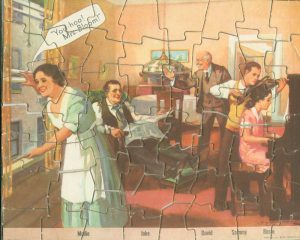A six-episode series that brings together Jewish and Indigenous creatives to tell the story of a First Nations child taken from her home and adopted during the Sixties Scoop will be premiering May 26 on Bell Media’s streaming service, Crave.
Christina Fon, executive producer of the Indigenous-owned production company Rezolution Pictures, brought the idea of Little Bird to Jennifer Podemski.
Once the scripts were written they brought on Nakuset as an advisor, whose story about an Indigenous woman who was taken from her family in Manitoba and adopted into a Jewish home in Montreal was featured in a CBC documentary.
Nakuset was part of a government-sanctioned mass removal of Indigenous children from their families into the child welfare system, often to be adopted by non-Indigenous families. The program ran from the 1960s to the 1980s.
Fon, who’s a Jewish Montrealer, initially imagined a show about the roots of Canada, spanning many years of Indigenous history. After spending four years developing the concept, she hit a wall—but then she pivoted to a scripted series specifically about the program, commonly known as the Sixties Scoop.
Jennifer Podemski, an actor-producer who is Jewish and Indigenous, was approached for the showrunner role. Hannah Moscovitch was subsequently recruited as head writer—and the award-winning playwright worked alongside Indigenous writer-director Zoe Hopkins.
Moscovitch wasn’t aware of the Sixties Scoop, but now believes it has to be spoken about, in order to heal trauma. A grandchild of Holocaust survivors, she sees similarities in the communities’ experiences.
“There’s bureaucracy involved in this genocide, a lot of it,” said Moscovitch. “And a lot of euphemized language that was familiar to me, like, ‘a solution to a problem.’ And to have it happened on such a mass scale. All of that was super familiar, and yet, I didn’t know about it, so I found that horrifying. I wanted to be involved as much as I could be, and it felt important and meaningful to me.”
Director-producer Jeremy Podeswa, who is also Jewish, was initially approached to direct, but he felt it important for the show to have an Indigenous director. And he was similarly aghast at the gaps in his Canadian education.
“I thought: how is it possible that I’ve lived all my life in Canada… and I didn’t know the story,” said Podeswa. “When I read the script, I just thought this will illuminate a lot of things for a lot of people and it’s very important.”
Podeswa, who is also a descendant of Holocaust survivors, ended up assuming the role of co-executive producer and Zoe Hopkins and Elle-Máijá Tailfeathers became directors.
The result is an emotionally charged and poignant six-part series, and the first of its kind to premiere on Crave, in association with the Aboriginal Peoples Television Network (APTN).
The story follows Bezhig Little Bird, who is taken from her home in Long Pine Reserve, Sask., at age five and adopted by a Holocaust survivor in Montreal.
The episodes shift between Bezhig’s life on the reserve as a child and her life in her 20s, where she has the name Esther Rosenblum and longs to reconnect with her roots. She searches for her birth family, and is shocked to learn about the government’s racist policies that led her away from them.
Fon described a kinship between the Jewish and Indigenous cast and crew, mirroring the fictional relationship between Esther and her adoptive mother, Golda, who understand each other’s pain due to their own experiences of genocide.
“Over the past 20 years, I’ve noticed that Jews and Indigenous people have a lot in common,” said Fon. “One of the first things I noticed is that Native people are really funny. They have a self-deprecating humour, and it’s somewhat similar to Jews, especially in very tragic moments.
“And obviously, you know, I can joke with some of my Indigenous friends that we have so much in common… genocide, displacement, and only they will laugh at that.”
Esther’s story is a fictionalized composite of personal testimonies of Sixties Scoop survivors, including Nakuset (who visited to the set and read every script in advance) and Raven Sinclair, a filmmaker and professor of social work at the University of Saskatchewan who specializes in the Sixties Scoop.
“One of the things that Jen and I talked about at the outset was that if this is the first telling of a genocide, it’s so important that you get authenticity and accuracy,” said Moscovitch. “There were many, many elders and advisors who came on and authenticated details with us. We worked really hard on that.”
Due to the emotionally difficult content of the show, the team ensured that there was a trauma therapist on set. Moscovitch said there wasn’t a single Indigenous person she worked with who hadn’t been affected by the Scoop in some way.
Fleshing out characters who commit horrible acts came easier to Moscovitch due to her understanding of the Holocaust.
“That is really a place where I felt like being Jewish helped me,” she said. “I’ve read Nazi ideology. They really genuinely believed that Jews were a sickness you had to cut out. They believed in a better world, a beautiful world with no Jews in it. So I kind of understood the mentality. How you become indoctrinated into that was of interest to me.
“How does it happen? How does it seep into someone’s identity?”
Executive producer Christina Fon is especially proud of how Little Bird explores how the character navigates her Jewish and Indigenous identity.
“When Esther is going through her journey, she’s a Jewish woman going to find her Indigenous family. To bridge those two things together within her, that’s very unique, we’ve never seen that….So the beautiful part is that we’re bridging those two cultures together within that character.”
Ilana Zackon and David Sklar have more coverage of Jewish arts in Canada and beyond on The CJN’s new podcast Culturally Jewish.







